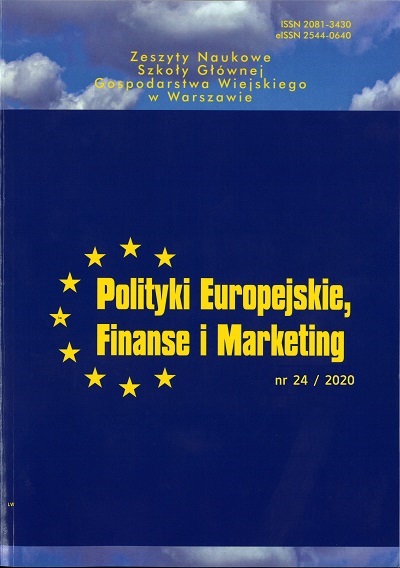Main Article Content
Article Details
Broda-Wysocki P., 2012: Wykluczenie i inkluzja społeczna. Paradygmaty i próby definicji. IPiSS, Warszawa, s. 25.[Social exclusion and inclusion. Paradigms and definition attempts. IPiSS, Warsaw, p. 25]
Frąckiewicz L. (Red.), 2005:Wykluczenie społeczne, Wydawnictwo Akademii Ekonomicznej im. Karola Adamieckiego, Katowice, s. 11[Social exclusion, publisher of the University of Economics of Karol Adamiecki, Katowice, p. 11].
Smuga T. (Red.), 2005:Metodologia badań szarej strefy na rynku usług turystycznychInstytut Koniunktur i Cen Handlu Zagranicznego, Warszawa[Gray market research methodology on the tourist services market Institute of Foreign Trade Pricing and Prices, Warsaw].
Praca nierejestrowana w Polsce w 1995 r., 1996: Informacje i opracowania statystyczne, Warszawa[Unregistered work in Poland in 1995, 1996: Statistical information and studies, Warsaw].
Praca nierejestrowana w Polsce w 1998 r., 1999, praca zespołowa pod kierunkiem S. Kostrubiec, GUS, Informacje i opracowania statystyczne, Warszawa[Unregistered work in Poland in 1998, 1999, teamwork under the direction of S. Kostrubiec, Central Statistical Office, Statistical information and studies, Warsaw].
Praca nierejestrowana w Polsce w 2010 r., 2011, praca zespołowa pod kierunkiem A. Zgierska, GUS, Informacje i opracowania statystyczne, Gdańsk[Unregistered work in Poland in 2010, 2011, teamwork under the direction of A. Zgierska, Central Statistical Office, Statistical information and studies, Gdańsk].
Przyczyny pracy nierejestrowanej, jej skala, charakter i skutki społeczne pod red. M. Bednarskiego, E. Kryńskiej, K. Patera, M. Walewskiego.2008. Raport przygotowany nazlecenie Departamentu Rynku Pracy Ministerstwa Pracy i Polityki Społecznej w ramach projektu „Przyczyny pracy nierejestrowanej, jej skala, charakter i skutki społeczne” współfinansowanego ze środków Europejskiego Funduszu Społecznego. Wykonawcy projektu: Instytut Badań i Spraw Socjalnych, Centrum Badania Opinii Społecznej (CBOS), CASE – Centrum Analiz Społeczno – Ekonomicznych Millward – Brown SMG/ KRC, Warszawa[Reasons for undeclared work, its scale, nature and social effects, edited by M. Bednarski, E. Kryńska, K. Pater, M. Walewski. 2008. Report prepared at the request of the Labor Market Department of the Ministry of Labor and Social Policy as part of the project 'Reasons for undeclared work, its scale, nature and social effects' co-financed by the European Social Fund. Project contractors: Institute for Research and Social Affairs, Public Opinion Research Center (CBOS), CASE - Millward Socio-Economic Analysis Center - Brown SMG / KRC, Warsaw].
Sobczak M. J., 2016:Wykluczenie społeczne i inkluzja społeczna z wykorzystaniem podmiotów ekonomii społecznej w Polsce na przykładzie województwa łódzkiego.Wydawnictwo Uniwersytetu Łódzkiego,Łódź, s. 15[Social exclusion and social inclusion using social economy entities in Poland on the example of the Lodz region. University of Łódź Publishing House, Łódź, p. 15].
Szewczyk-Jarocka M., 2019: Social inclusion of individuals suffering from exclusion – evaluation of motives and actions in view of own research. Acta Scientarium Polonorum 18 (1), Warszawa, s. 81-89[Warsaw, p. 81-89].
Szewczyk – Jarocka M., 2019: Job counseling a tool for social inclusion: empirical research in Poland. Economic Science for Rural Development 2019, Latvia, p. 188 – 193.
Szewczyk – Jarocka M., 2019: Opinions of socially excluded individuals on conducting business activity and being employed on a full-time basis in view of own research, Research Papers of Wrocław University of Economics, 2019 vol. 63 nr 5, Wrocław, p. 90 – 101.
Downloads
- Mirosław Sołtysiak, SENIORS ON THE MARKET OF BANKING SERVICES IN POLAND , The Scientific Journal European Policies, Finance and Marketing: No. 24(73) (2020)
You may also start an advanced similarity search for this article.

This work is licensed under a Creative Commons Attribution-NonCommercial 4.0 International License.
All articles published in European Policies, Finance and Marketing are fully open access. In this way, the scientific research results contained in articles published in our journal are available to every reader free of charge - in accordance with the CC BY-NC license (https://creativecommons.org/licenses/by-nc/4.0/).
According to the CC BY-NC license you are free to:
- Share — copy and redistribute the material in any medium or format
- Adapt — remix, transform, and build upon the material
The licensor cannot revoke these freedoms as long as you follow the license terms.
Under the following terms:
- Attribution — You must give appropriate credit , provide a link to the license, and indicate if changes were made . You may do so in any reasonable manner, but not in any way that suggests the licensor endorses you or your use.
- NonCommercial — You may not use the material for commercial purposes .
- No additional restrictions — You may not apply legal terms or technological measures that legally restrict others from doing anything the license permits.
Source: https://creativecommons.org/licenses/by-nc/4.0/deed.en
According to that, the authors retain the copyright and full publishing rights.





